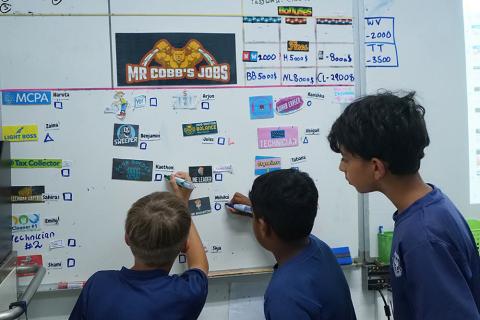Fostering Student Agency through Classroom Economy

As educators at Chatsworth International School, we constantly strive to create an engaging and productive learning environment that promotes student agency and responsibility within our holistic IB curriculum. One innovative approach to achieving this goal is by implementing a classroom economy system. By introducing a classroom economy, we can empower students to take ownership of their learning, enhance their decision-making skills, and foster a sense of responsibility and collaboration within the classroom. In this post, we will explore the benefits of using a classroom economy as a classroom management tool to promote student agency.
Promoting Responsibility
A classroom economy allows students to experience the real-world consequences of their actions. By assigning classroom jobs and paying students for their work, we provide opportunities for them to take on a variety of roles and responsibilities. This instils a sense of accountability and teaches them the value of hard work. As students earn and manage their classroom currency and investments, they learn about budgeting, saving, and making informed choices, skills that will benefit them beyond the classroom.
Enhancing Decision-Making Skills
With a classroom economy, students are faced with making financial decisions. They must decide how to spend and save their earnings wisely. This encourages critical thinking, problem-solving, and evaluation of their needs versus wants. Through this process, students develop important decision-making skills that will serve them well throughout their lives.
Fostering Collaboration and Teamwork
A classroom economy relies on collaboration and teamwork. Students work together to accomplish shared goals, such as maintaining the cleanliness of the classroom or organising classroom materials. They learn to rely on each other, communicate effectively, and understand the importance of collective effort. These collaborative experiences build strong relationships among students and create a positive classroom community. In addition, this management system puts the IB Learner Profile Attributes and ATL skills in the spotlight each day and each lesson as well as transition time and free time. The students actually helped to create an Learner Profile Stock Market which incentivises compensable behaviour, work ethic and accountability. Not to mention reinforces their mathematical skills each and every day.
Creating Incentives for Positive Behaviour
A classroom economy provides an effective framework for promoting positive behaviour. Students can earn Learner Profile Stocks, which they can choose to hold in hopes for an increase in future value or convert to currency immediately, for demonstrating desired behaviours, such as active participation, completing learning engagements on time, managing their time efficiently, or showing kindness to others to name a few. They can then exchange their earnings for rewards and prizes at the end of each month during our classroom auction, thus creating a system of positive reinforcement. This approach motivates students to strive for excellence and reinforces positive habits.

Developing Financial Literacy
Introducing a classroom economy offers an opportunity to teach students valuable financial literacy skills. Students learn about earning, saving, spending, and even investing their classroom currency. Everything in the classroom can be bought by the student and rented back to their teacher for a pre-negotiated rate of return. Additionally, when the bank starts to run low on currency, it will issue bonds to students which, if held to maturity, can be exchanged for their initial principal and interest reinforcing the idea of delayed gratification. This type of mathematical application not only teaches them about calculating percentages, but also how to think differently about earning money. By engaging in hands-on financial transactions within the classroom, they develop a practical understanding of economic concepts, budgeting, and making informed financial decisions.
Implementing a classroom economy as a classroom management tool is a powerful way to promote student agency, responsibility, and collaboration. By providing opportunities for students to take ownership of their learning, make decisions, and experience real-world consequences, we prepare them for success both inside and outside the classroom. Moreover, a classroom economy fosters a positive and supportive classroom community, where students work together towards common goals.We have actually had many student-founded businesses pop up throughout the year in our classroom as they learn more and more about the financial world around them. As educators, we can embrace this innovative approach to empower our students and create a classroom environment that nurtures their growth and development.





